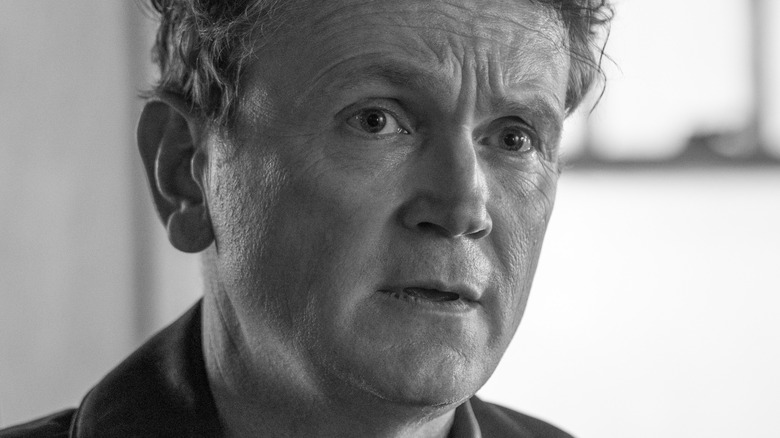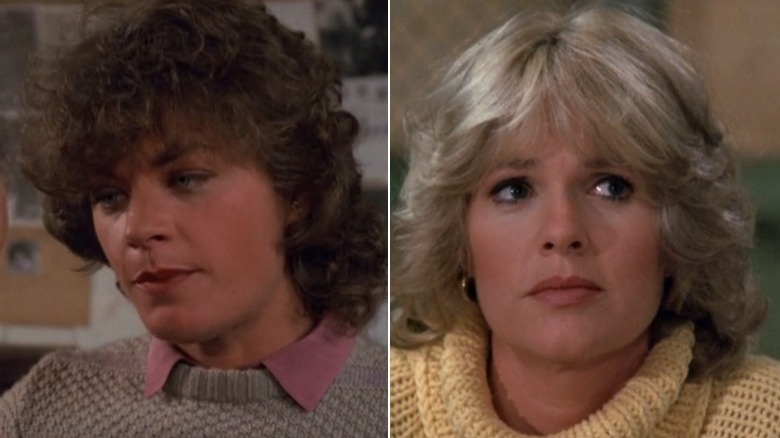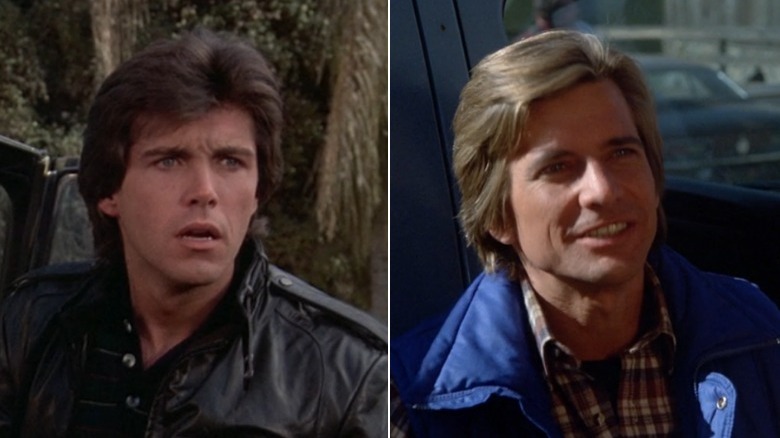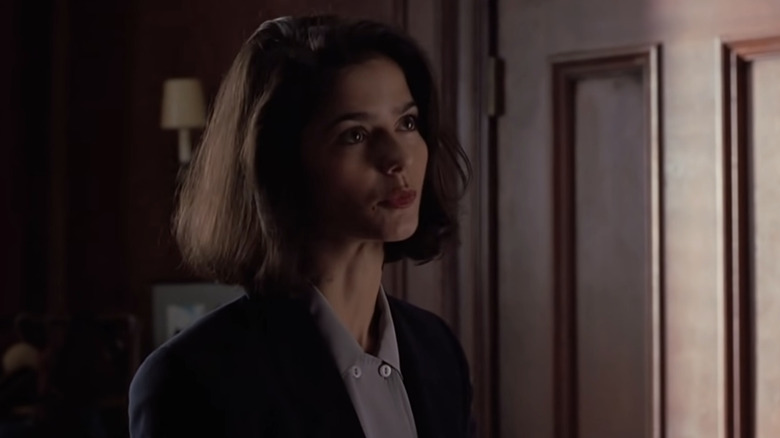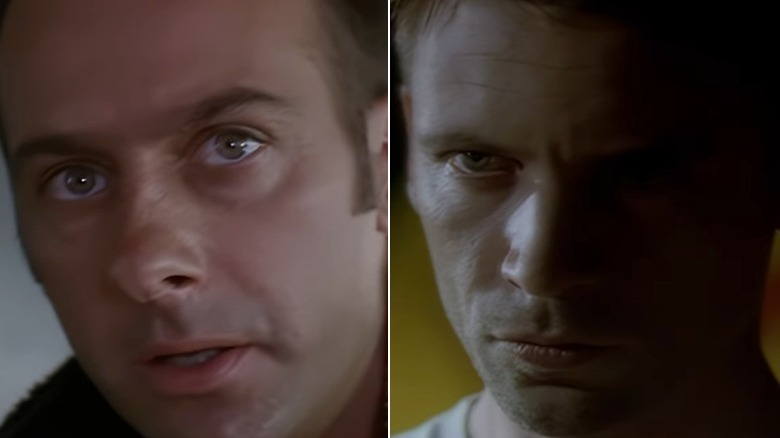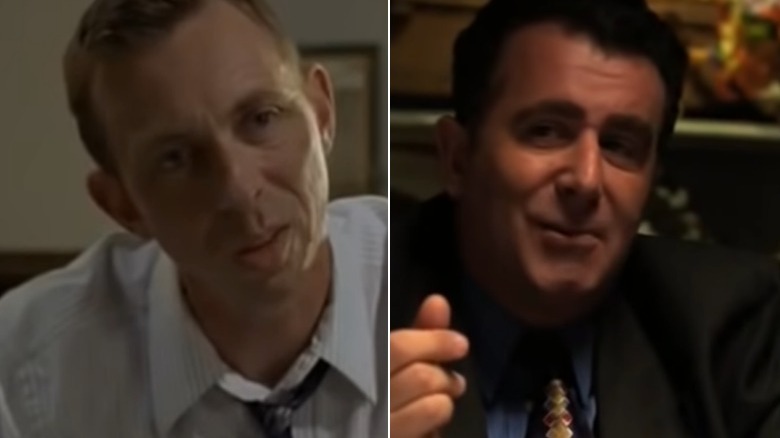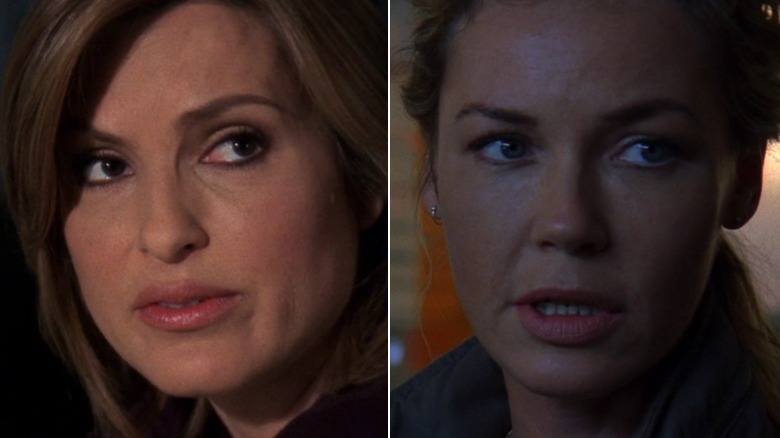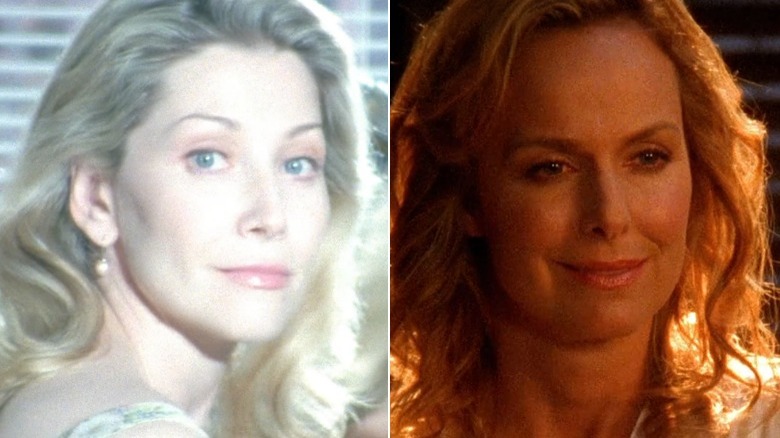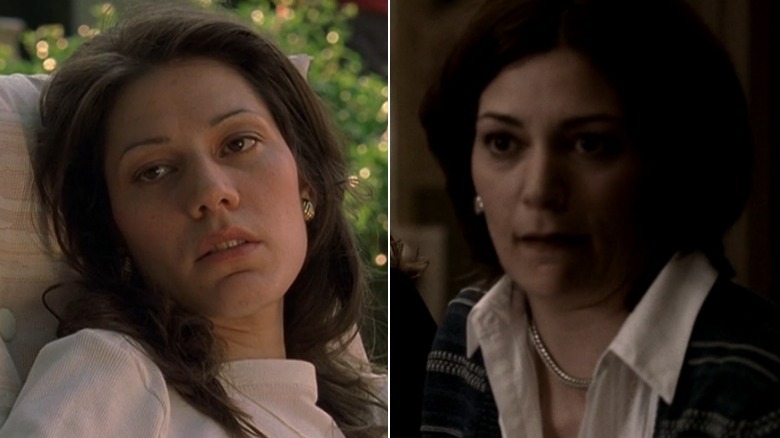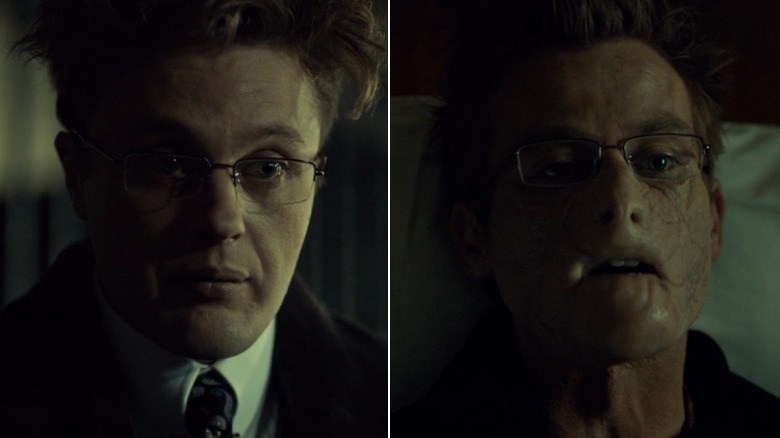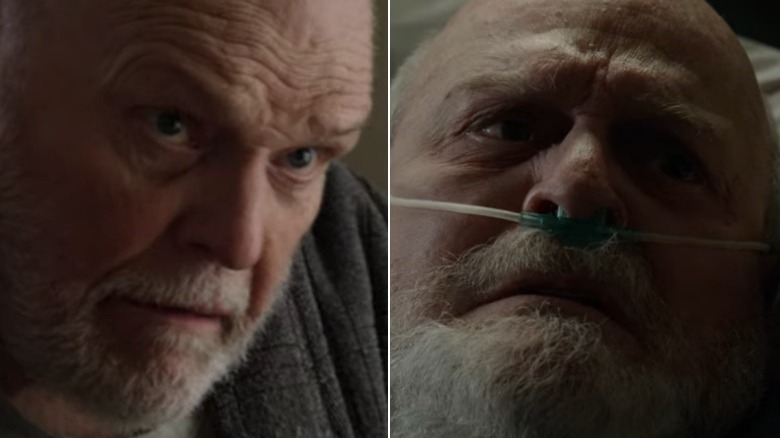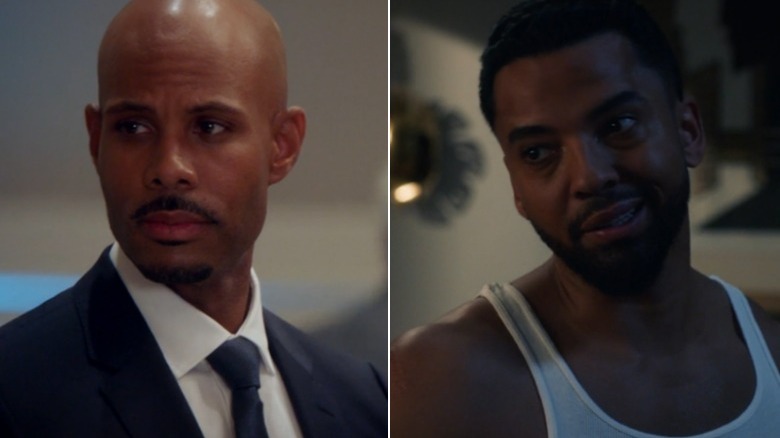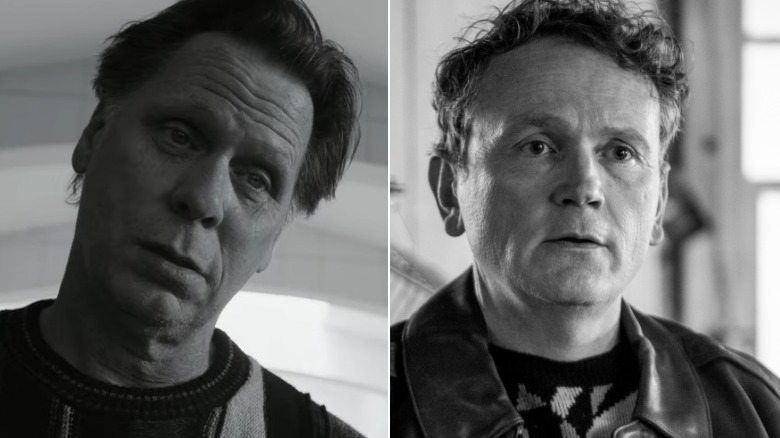Crime Show Casting Replacements You Totally Forgot About
In 1969, actor Dick Sargent replaced Dick York as Darrin Stephens, the put-upon husband of wild witch Samantha in the hit supernatural sitcom, "Bewitched." The controversial move remains perhaps the most famous example of a television show recasting an actor between seasons; when "Roseanne" cast Sarah Chalke as elder daughter Becky to replace Lecy Goranson in 1993, the memory of the two Darrins was invoked not only in news coverage of the recasting, but in the show itself.
There are many reasons why a show might need to recast a main character. In Goranson's case, she left to pursue a college education (but returned to the show for its eighth season and 2018 reboot), while York's departure was prompted by personal issues stemming from a painkiller addiction. Sometimes an actor will be replaced in a show due to schedule conflicts, or because the chemistry between the performers isn't quite up to par. There can be behind-the-scenes or political reasons, or sometimes tragic reasons, in the case of an actor's sudden death. In very rare instances, a recasting happens because it turns out an actor is a better fit for a different character on the same show. Let's take a look at some casting replacements you might have forgotten about from the world of crime dramas.
Sharon Gless replaced Meg Foster in Cagney and Lacey
It's New York City in the early '80s; Christine Cagney is a modern single woman and a former fashion model, raised in a comfortable middle-class home; Mary Beth Lacey is a no-nonsense working mom from the neighborhood. Together they are beat cops, patrolling the mean streets of Midtown Manhattan while fighting against institutional sexism in their own ranks. "Cagney and Lacey" had a passionate fan base that saved it from cancellation twice, and stars Tyne Daly (as Lacey) and Sharon Gless (as Cagney) dominated the Lead Actress Emmy category for the entire six-year run of the series.
But Gless was not the first actress cast as Cagney, or even the second. The series began with a TV movie starring Daly and "M*A*S*H*" star Loretta Swit; when Swit was unavailable for the show, Meg Foster was cast in her place, but after six episodes, Gless took over the part. In a wide-ranging 2008 interview, series producer Barry Rosenzweig revealed the reason for Foster's departure was one of compatibility: her performance was too similar to what Daly was creating as Lacey. "It became 'Lacey and Lacey,'" he said. At the time of the recasting, however, Rosenzweig gave a much different rationale when interviewed by TV Guide (via HuffPost): that viewers found Foster not feminine enough, and that together she and Daly read as lesbians — an apparently distasteful situation to viewers in 1981.
Dirk Benedict replaced Tim Dunigan in The A-Team
"If you have a problem, if no one else can help, and if you can find them, maybe YOU can hire ... the A-Team!" So goes the famous opening narration of "The A-Team," super-producer Stephen J. Cannell's 1980s action series about a quartet of Vietnam vets who work as mercenaries in the Los Angeles underground, taking the kinds of suicide missions that no one else is bold (or crazy) enough to expect. The series stars '60s leading man George Peppard as "Hannibal" Smith, the leader of the group, Dwight Schultz as pilot "Howlin' Mad" Murdock, "Rocky III" breakout star Mr. T as all B.A. Baracus (the B.A. stands for "Bad Attitude"), and "Battlestar Galactica" star Dirk Benedict as master of disguise, "Faceman" Peck.
But the first time around, "Faceman" had a different face altogether. In the show's pilot episode, Peck is played by "Love Boat" star Tim Dunigan. The issue with Dunigan, appropriately enough, was his face. Though technically (if barely) old enough to have served in Vietnam, it was decided that, in Dunigan's own words, he was "too young and too tall" for the role. Benedict, who apparently had been Cannell and co-creator Frank Lupo's first choice, was cast and played the part for the rest of the series.
Jacqueline Hennessy stood in for Jill Hennessy in one episode of Law & Order
"Law & Order" and its spinoffs have had no shortage of cast turnover over the decades since premiering in 1990. Part of that is baked into the premise of the show — detectives and attorneys come in and out on a regular basis and the departures are explained by transfer, retirement, arrest, or even death. The eras of the show come to be defined by who is running the two separate but equally important groups in the criminal justice system. Seasons 4 through 6 encompass Jill Hennessy's turn as Assistant District Attorney Claire Kincaid.
Toward the end of Hennessy's run on the show, she appeared in character as Kincaid on a 1996 episode of "Homicide: Life on the Street," which, while not a "Law & Order" spinoff, existed in the same television universe and occasionally shared characters, most memorably Richard Belzer's Detective John Munch. Filming "Homicide" on location in Baltimore, however, meant that Hennessy missed a few days of filming the Season 6 "Law & Order" episode "Corpus Delicti." Luckily, she had a novel solution to this problem: her identical twin sister Jacqueline, who played Kincaid for a few background courtroom shots.
Callum Keith Rennie replaced David Marciano in Due South
The CBS cop dramedy "Due South" premiered in 1994 and ran for four seasons. Created by future "Crash" and "Million Dollar Baby" writer Paul Haggis, the series stars Paul Gross ("Slings and Arrows") as forthright Canadian mountie Benton Fraser, who journeys to Chicago to find his father's killer. He teams up with streetwise detective Ray Vecchio (David Marciano) and ends up staying in America, working with the Chicago Police Department as a liaison to the Canadian consulate.
In the Season 3 premiere "Burning Down the House," Fraser returns from a well-deserved vacation to find that his partner Vecchio looks ... different than he used to. He looks, in fact, like character actor Callum Keith Rennie, but everyone around him seems to treat him like the same old Ray. Fraser's confusion is a fun twist on the "Old Darrin/New Darrin" trope, but it turns out that Fraser hasn't gone crazy. Vecchio looks different because he's not actually Vecchio, but Detective Stanley Kowalski, who is posing as Vecchio while the genuine article goes undercover with the FBI. Kowalski would be Fraser's partner for the rest of the series, though Marciano would return for a cameo in the series finale two-parter, "Call of the Wild."
Saul Rubinek replaced Gerry Quigley in A Nero Wolfe Mystery
It's not terribly rare for an actor to be replaced on a series after the first episode or early in the show's run; we've seen that a couple of times already on this list. But it is pretty rare for an actor to be replaced by another actor on the same show. That was the case with the 2001 series "A Nero Wolfe Mystery" (or simply "Nero Wolfe"). Starring Maury Chaykin as the eponymous 1950s detective and Timothy Hutton as sidekick and muscle Archie Goodwin, the short-lived series ran on A&E for just two seasons and was notable for operating on a sort of "repertory" model. Instead of casting all new actors for each episode's "case of the week," as most detective shows do, the series used the same core group of supporting actors, playing new characters in every episode.
Like "Cagney and Lacey," the series began with a TV movie in 2000 based on Rex Stout's Nero Wolfe novel "The Golden Spiders." Chaykin and Hutton were in place as Wolfe and Goodwin, while actor Saul Rubinek ("Dick," "The Ballad of Buster Scruggs") played Wolfe's associate Saul Panzer and Gerry Quigley played newspaper reporter Lon Cohen, a frequent ally to the detective. When the series was picked up, however, Rubinek was recast as Cohen and Conrad Dunn ("Stripes") took up the role of Panzer.
Connie Nielsen temporarily replaced Mariska Hargitay in Law & Order: SVU
The "Law & Order" franchise is no stranger to inventive solutions for temporarily unavailable cast members, as we saw with Jill and Jacqueline Hennessy. "Law & Order: Special Victims Unit" (or just "SVU") premiered in 1999, the first spinoff of the series and technically a spinoff of "Homicide: Life on the Street" as well, with Richard Belzer joining the main cast as recent Baltimore transplant Detective Munch. The series follows the dedicated detectives of the sex crimes-focused Special Victims Unit and delves further into the personal lives of its leads than the original show ever does, especially Mariska Hargitay as Detective Olivia Benson and Christopher Meloni as her volatile partner, Elliot Stabler.
In 2006, it was announced that Hargitay was taking a short leave of absence from the show to accommodate her pregnancy. Oftentimes when an actress is pregnant a show will incorporate it into the show or try to hide it via big coats and laundry baskets and the like, but Hargitay instead stepped away for the final months of her pregnancy. In her place, the show brought in Connie Nielsen as Detective Dani Beck, partnering her with Stabler for a six-episode run in the middle of Season 8. Her character was clearly meant to be temporary until Hargitay returned, though according to Nielsen, some fans were not pleased by her presence, stating in a 2020 interview that she still gets Dani Beck hate mail from fans (via comingsoon.net).
Melora Hardin replaced Stellina Rusich in Monk
Tony Shaloub's "defective detective" in the comedy series "Monk," in truth, was always socially awkward with a touch of obsessive-compulsive disorder; various flashbacks through the seasons and a visit from his brother (John Turturro) confirm that his various conditions were always present within him. But the moment that turned his life upside down and exacerbated his issues to the point that he had to leave the San Francisco Police Department and hire a nurse to assist him, is the murder by car bomb of his wife, Trudy. "Monk" begins after Trudy's death, but the mystery surrounding it is the show's primary ongoing story, reaching from the first episode all the way to the last.
In the first two seasons, Trudy is represented by a few silent flashbacks and photographs on Monk's mantle, played by Stellina Rusich. Starting with Season 3's flashback-heavy "Mr. Monk and the Game Show," however, Trudy is played in flashbacks by Melora Hardin, arguably still best known for playing Jan Levinson in "The Office." Hardin would appear a few more times, most notably in the two-part series finale where her murder is finally solved. Interestingly, as the series went on the props department used photos of both Rusich and Hardin interchangeably, and even sat them next to each other in Monk's house.
Danielle Di Vecchio replaced Nicole Burdette in The Sopranos
Generational trauma is at the heart of David Chase's landmark series "The Sopranos," the HBO mob drama that in many ways revolutionized television, opening the medium up to a more mature, serialized mode of storytelling. Tony Soprano (James Gandolfini) is a mid-level New Jersey mobster who is profoundly depressed and dissatisfied with his life in ways that he can't articulate. Much of his trauma can be traced back to his mother Livia (Nancy Marchand) and Uncle Junior (Dominic Chianese), as well as the ghost of his father, Johnny Boy. Starting in Season 2, Tony's wayward sister Janice (Aida Soprano) reappears; she dealt with their tumultuous upbringing by moving west and embracing new age philosophies, but cannot help but get drawn back into the life.
Tony and Janice are not the only Soprano siblings, however. There is one more — a little sister who got out and stayed out, Barbara, played in a handful of episodes in Season 2 by Nicole Burdette. Barbara lives out of town with her family and she's rarely involved with the business of the Sopranos. The character is absent from Seasons 3 and 4 before returning for ten episodes in the show's last two seasons, this time played by Danielle De Vecchio. Even with her increased presence in the series' final run, Barbara was never a main character, and her role was by far the smallest of anyone else in the family.
Joe Anderson replaced Michael Pitt in Hannibal
NBC's "Hannibal," based on the bestselling novels by Thomas Harris, was unlike any show on network television. Baroque, gorgeous, and gruesome, series creator Bryan Fuller ("Pushing Daisies," "Star Trek: Discovery") crafted a bloody thriller for three seasons that was beautiful to watch, even if you were watching through your fingers. Centered around haunted FBI profiler Will Graham (Hugh Dancy) and his psychiatrist, the erudite gourmet Hannibal Lecter (Mads Mikkelsen), the series follows Graham's attempts to catch various serial killers and protect his own fragile sanity, while Lecter works to keep Graham and his FBI boss Jack Crawford (Laurence Fishburne) from discovering that he is a brutal, cannibalistic killer himself.
Season 2 works in elements from the Harris sequel novel "Hannibal," introducing meatpacking heiress Margot Verger (Katharine Isabelle) and her sadistic, incestuous brother Mason, played by Michael Pitt ("The Dreamers," "Funny Games"). Hannibal punishes Mason, not just for his abuse of Margot but for his general impoliteness, by drugging him and forcing him to mutilate and eat his own face. In Season 3, Verger returns for revenge, paralyzed from the neck down and his face horribly disfigured; the actor underneath the prosthetics is not Pitt, however, but actor Joe Anderson ("Across the Universe"), as Pitt declined to return to the role after Season 2.
Ron Raines replaced Brian Dennehy in The Blacklist
Premiering on NBC the same year as "Hannibal" and sporting a somewhat similar premise was "The Blacklist." James Spader stars as "Red" Reddington, a master criminal who evaded capture for decades, only to turn himself into the FBI. In exchange for immunity, he promises to help the FBI track down the most dangerous criminals and terrorists he ever worked with — his "blacklist" — but he will only work with rookie profiler Elizabeth "Liz" Keen (Megan Boone). While the series works in a "case of the week" style, with Red and Liz bringing down one illegal operation or another, the central mystery of Red's true identity and his connection to Liz power the show through ten high-intrigue seasons.
The mystery of both Red and Liz's backgrounds got a major hint with the introduction of Dominic Wilkerson in Season 3, played by Brian Dennehy. A former KGB agent posing as a retired "systems analyst," Dom has a long, messy history with Red, one that intersects with the mysteries of Liz's own background. After a handful of appearances through the years, Dom becomes integral to the show's ongoing storyline starting in Season 7, but the show's producers were thrown a tragic curveball when Dennehy passed away in April 2020. Rather than rework the upcoming season's scripts, they decided to recast the role with actor Ron Raines, who played Dom for three episodes in Season 8.
Christian Keyes replaced Todd Williams in All Rise
Sometimes a show must recast a part due to the death of an actor, but sometimes it's due to the death of the show itself. That was the case with "All Rise," the CBS courtroom drama that premiered in 2019. Simone Messick ("Luke Cage") stars as Lola Carmichael, a former prosecutor turned Los Angeles County's newest judge, and the series follows the ins and outs of her daily caseload, as well as the lives of the men and women who worked every day at the courthouse: her fellow judges, her old prosecutor colleagues, clerks, bailiffs, reporters, and more. Lola's husband, FBI agent Robin Taylor, is played for the first two seasons by Todd Williams ("San Andreas").
The show was canceled after two seasons by CBS in May 2021. Several months later, however, it was saved from oblivion by the Oprah Winfrey Network, and a third and final season aired on OWN in 2022. Taking place a year after the events of Season 2, which saw Lola have a baby and lose her judge seat after defending an innocent woman from arrest. Most of the original cast returned for the revival, with the exception of Williams, who had booked the Amazon YA series "Panic." In his place, actor Christian Keyes ("The Boys") stepped in as Robin for Season 3.
Pat Healy replaced Don Harvey in Better Call Saul
Each season of the "Breaking Bad" prequel, "Better Call Saul," begins with an enigmatic black-and-white sequence following the gray, paranoid life of Jimmy McGill (Bob Odenkirk), formerly known as New Mexico criminal lawyer Saul Goodman, now living as Cinnabon manager Gene Takovic after the explosive events of the final season of "Breaking Bad." Starting in Season 3, however, those opening scenes coalesce into an ongoing story, as a panic attack puts Gene in the hospital. Season 4 begins with Gene's cab ride back from the hospital, where his driver (Don Harvey) has an Albuquerque Isotopes decal on his mirror and keeps shooting glances. Season 5 reveals that the driver, Jeff, does indeed recognize Gene as Saul, but his motivations remain unclear.
The sixth and final season forgoes the black-and-white scenes until the final three episodes, where Gene decides not to run again, but to confront Jeff and neutralize him via an old-fashioned Slippin' Jimmy con game. For these final episodes, however, Harvey was not available due to his commitment to the HBO series "We Own This City." Pat Healy ("The Post," "Hap and Leonard") stepped into the role, which changed the dynamic of the character somewhat. Harvey's take had a hint of menace, while Healy's was more of a sad sack divorceé, living with his mother (Carol Burnett) and desperate for a taste of the Saul Goodman lifestyle.
